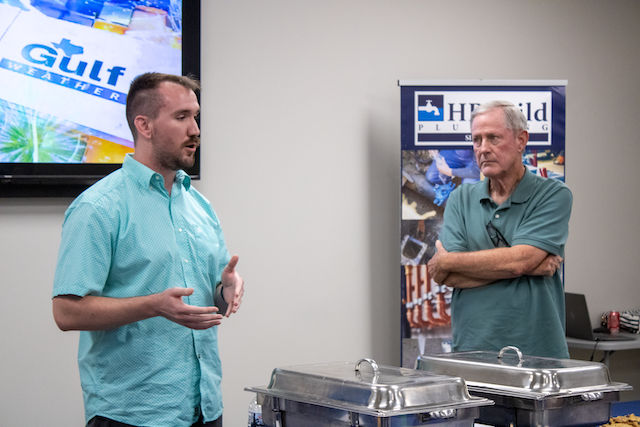Texas Senate votes to advance property tax reform bill, avoids “nuclear option” procedural move
Published 3:50 pm Monday, April 15, 2019

- Lt. Gov. Dan Patrick speaks from the dais in the Senate chamber. (Juan Figueroa/The Texas Tribune)
By Shannon Najmabadi
and Emma Platoff
The Texas Tribune
texastribune.org
The Texas Senate broke a logjam Monday that had paralyzed the upper chamber’s priority legislation for weeks, blunting a controversial provision in its property tax reform package and then advancing the bill without having to deploy a procedural “nuclear option.”
Though a vote on Senate Bill 2 had been expected last week, an apparent lack of support had stalled the vote in the upper chamber, where the backing of 19 senators is generally required to bring a bill up for debate. After Republican Lt. Gov. Dan Patrick threatened to blow past decades of tradition and bring the measure to a vote with only a simple majority — state Sen. Kel Seliger, a vocal dissenter, relented, allowing the bill onto the floor for debate but insisting he ultimately would not support its passage.
Seliger’s announcement came alongside a reworked bill which, following a weekend of negotiations, came to the floor Monday with a handful of technical changes and one notable concession. SB 2 was updated to force cities, counties and other local taxing entities other than school districts to receive voter approval before raising 3.5% more property tax revenue than the previous year — rather than the 2.5% trigger originally proposed. School districts would still face a 2.5% under the version of the bill approved by the Senate Monday. The trigger would only apply to new revenue from existing properties, not new construction.
Currently, taxing units can levy 8% more property tax revenue before voters can petition for an election to roll back the increase. SB 2 would make those elections automatic, and propose a battery of widely-supported reforms designed to increase transparency and utility for taxpayers.
In a lengthy speech explaining his decision, Seliger criticized Patrick for even floating the “nuclear option” — and suggested his vote letting SB 2 advance was at least partly driven by a desire to prevent the Senate from taking a procedural move that “discredits this body.”
“We have a way to do things that I think is important. It underscores that we must be willing to compromise,” Seliger said. He added: “This bill’s going to pass. Right now, nobody can get in the way.”Democrats, municipal leaders and Seliger, a former mayor, have called the 2.5% figure punitively low, and said it would cripple local governments’ ability to provide public safety services. A one-percentage point increase is unlikely to appease them; the Senate and House deadlocked at higher thresholds of 4% and 6% in 2017.
Democratic senators proposed Monday dozens of amendments to exempt hospital districts, community colleges, and certain municipal services from parts of the property tax legislation. Most of the proposals failed on largely party lines.
One successful amendment, from Sen. Pete Flores, R-Pleasanton, allows for money counties spend on indigent defense to be partly excluded from the revenue growth calculation.
In the end, after around three hours of debate, the vote to pass SB 2 was 18-13. Legislative rules require that the measure be voted on a final time by the upper chamber, before being sent to the House for further debate.
The House, meanwhile, has postponed a debate on its own property tax reform legislation — House Bill 2 — until April 24. Unlike the Senate’s version, the House has exempted hospital districts, community colleges, emergency service districts and school districts from abiding by a 2.5% election trigger.
SB 2’s progress Monday came after more than two months of stalemate in the upper chamber, and after the Senate stalled again on Thursday, when the measure was expected to hit the floor for the first time. That evening, after hours of closed-door negotiations, Patrick informed several Democratic senators that if no deal had been reached by Monday, he would take the “nuclear option” — blowing past a tradition that requires three-fifths of senators to vote to bring a bill to the floor — to pass the measure.
That threat seems to have greased the skids for negotiations, which lasted through the weekend. As recently as Sunday night, Patrick signaled a willingness to take the “nuclear” step.
“If that is the only choice left to me to pass meaningful and lasting property tax reform and relief on Monday, I will use it,” he wrote in an email to supporters. “You elected me to lead, and I will do just that. Property tax reform and relief, not following procedures, is the top priority. Time is running out on the Legislative Session and we need to act now.”
The Texas Tribune is a nonpartisan, nonprofit media organization that informs Texans — and engages with them – about public policy, politics, government and statewide issues.





